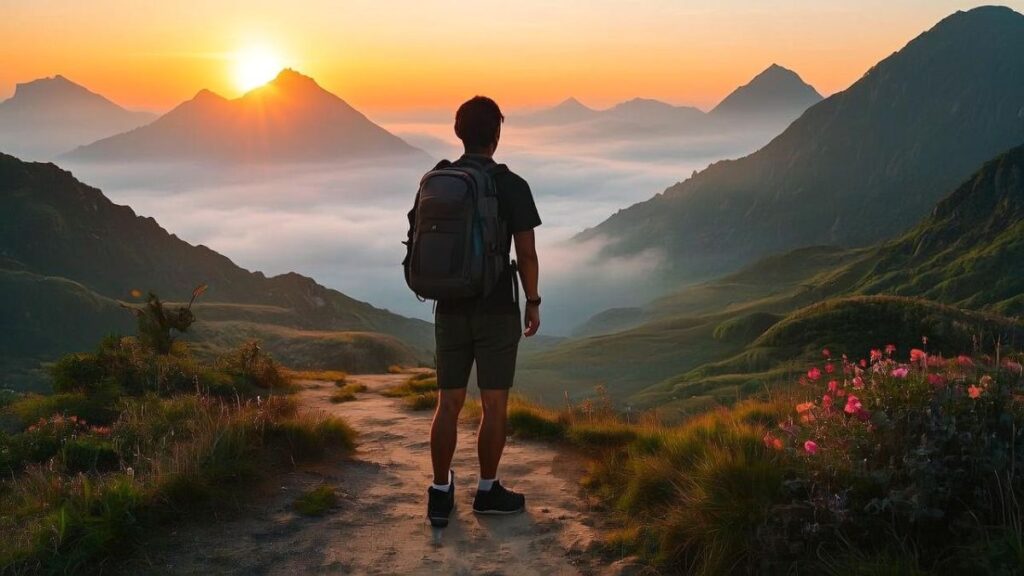The empowering experience of solo travel represents one of life’s most transformative adventures, offering individuals the opportunity to discover not only new destinations but also profound insights about themselves. When you embark on a journey alone, you unlock doors to personal growth, independence, and self-discovery that simply cannot be replicated when traveling with others. This comprehensive exploration delves into why solo travel has become increasingly popular and how it can fundamentally change your perspective on life, relationships, and your own capabilities.
Solo travel creates an environment where you are entirely responsible for your decisions, from choosing which museum to visit to navigating unfamiliar subway systems. This complete autonomy forces you to develop confidence in your decision-making abilities and trust your instincts. Unlike group travel where responsibilities are often shared or delegated, traveling alone means you must rely entirely on yourself, which naturally builds resilience and problem-solving skills that extend far beyond your vacation experiences.
The psychological benefits of solo travel are numerous and well-documented. When you remove yourself from familiar social circles and comfort zones, you create space for genuine self-reflection and personal assessment. Many solo travelers report feeling more confident, independent, and capable after returning from their journeys. This transformation occurs because solo travel consistently presents challenges that require you to step outside your comfort zone and adapt to new situations, ultimately strengthening your character and self-assurance.
Understanding the Appeal of Solo Travel
The modern world has witnessed a significant shift in travel patterns, with more people choosing to explore the world independently rather than waiting for group opportunities or suitable companions. This trend reflects changing social dynamics, increased financial independence among various demographics, and a growing recognition of the unique benefits that solo travel provides. The empowering experience of solo travel appeals to individuals across all age groups, from young adults seeking adventure to retirees pursuing lifelong dreams of exploration.
Several factors contribute to the growing popularity of solo travel among diverse populations. Economic independence has allowed more people to fund their own adventures without relying on others’ schedules or financial contributions. Social media and travel blogs have also played crucial roles in normalizing and promoting solo travel, showcasing real experiences and practical tips that make independent travel seem more accessible and less intimidating. Additionally, changing work structures and remote work opportunities have provided greater flexibility for extended travel periods.
The demographic breakdown of solo travelers reveals interesting patterns and motivations. Young professionals often use solo travel as a means of personal development and career enhancement, while middle-aged individuals may seek solo adventures during life transitions or as a way to rediscover themselves. Older adults frequently embrace solo travel as a way to maintain independence and continue exploring the world on their own terms.
Essential Preparation Strategies for Solo Travel
Proper preparation forms the foundation of successful and safe solo travel experiences. The empowering experience of solo travel begins long before you board your first flight or pack your suitcase. Thorough research and careful planning can significantly enhance your safety, enjoyment, and overall travel experience while solo. This preparation phase involves multiple components that work together to create a smooth and rewarding journey.
Destination research becomes particularly crucial when traveling alone, as you cannot rely on others’ knowledge or split responsibilities. Understanding local customs, language basics, transportation systems, and cultural norms helps you navigate your chosen destination with greater confidence and respect. This research should extend beyond typical tourist information to include practical details like emergency services, local laws, and appropriate dress codes for different situations.
Safety considerations represent one of the most important aspects of solo travel preparation. While the world is generally safe for solo travelers, taking proactive safety measures demonstrates responsible travel behavior and helps prevent potential issues. This includes registering with your embassy, sharing your itinerary with trusted contacts, understanding local emergency numbers, and researching safe accommodation options in advance.
Financial preparation for solo travel requires careful consideration of budgeting, payment methods, and emergency funds. Solo travelers often face different financial challenges than group travelers, including potentially higher per-person costs for accommodations and activities. Creating a realistic budget that accounts for solo traveler expenses, plus establishing backup funding sources, ensures financial security throughout your journey.
Choosing the Right Destinations for Solo Travel
Selecting appropriate destinations plays a crucial role in ensuring positive solo travel experiences. The empowering experience of solo travel is enhanced when you choose locations that align with your interests, comfort level, and travel goals. Different destinations offer varying levels of solo traveler friendliness, infrastructure support, and cultural attitudes toward independent travelers.
First-time solo travelers often benefit from choosing destinations known for their welcoming atmosphere toward independent travelers. Countries with established tourism infrastructure, English-speaking populations, and strong safety records typically provide gentler introductions to solo travel. These destinations allow you to build confidence and develop solo travel skills before venturing into more challenging environments.
Cultural considerations significantly impact solo travel experiences and should influence destination selection. Some cultures naturally embrace solo travelers and provide excellent opportunities for social interaction, while others may present more challenges for independent exploration. Understanding these cultural dynamics helps you choose destinations that match your personality and travel style preferences.
Seasonal factors also play important roles in destination selection for solo travelers. Peak tourist seasons often provide better infrastructure support and more social opportunities, while off-season travel may offer cost savings and authentic local experiences. Weather patterns, local holidays, and seasonal activities should all factor into your destination decision-making process.
Accommodation Options for Solo Travelers
Finding suitable accommodation represents both a practical necessity and an opportunity to enhance your solo travel experience. The empowering experience of solo travel can be significantly influenced by your choice of lodging, which affects everything from your daily budget to your social opportunities and overall comfort level. Various accommodation types offer different benefits and considerations for solo travelers.
Hostels remain popular among solo travelers due to their social atmosphere and budget-friendly pricing. Many hostels specifically cater to solo travelers by organizing group activities, providing common areas for socializing, and offering single-occupancy rooms when privacy is preferred. Modern hostels have evolved beyond basic dormitory-style accommodations to include private rooms, boutique amenities, and specialized services for independent travelers.
Hotels offer varying levels of service and social interaction depending on their size and style. Large international hotel chains often provide excellent security and service consistency, while smaller boutique hotels may offer more personalized attention and local insights. Many hotels now recognize the growing solo traveler market and provide amenities specifically designed for independent guests.
Alternative accommodation options have expanded significantly with the growth of platforms like Airbnb and similar services. These options provide opportunities to experience destinations like a local while maintaining independence and privacy. However, they also require additional research and communication skills to ensure safe and satisfactory experiences.
Safety Considerations and Risk Management
Personal safety remains a primary concern for solo travelers, particularly those traveling alone for the first time. The empowering experience of solo travel includes developing confidence in managing personal safety and making informed decisions about risk assessment. Understanding safety fundamentals and implementing practical safety measures creates a foundation for worry-free exploration and genuine adventure.
Research-based safety preparation involves understanding destination-specific risks, local emergency procedures, and cultural factors that may affect personal safety. This research should include official government travel advisories, local crime statistics, and advice from recent travelers. However, it’s important to balance caution with openness to new experiences, avoiding excessive fear that might limit your travel opportunities.
Communication strategies for solo travelers include maintaining regular contact with family or friends, using location-sharing technology, and establishing check-in protocols. These communication practices provide peace of mind for loved ones while ensuring someone knows your whereabouts in case of emergencies. Modern technology offers numerous tools for staying connected while traveling independently.
Emergency preparedness for solo travelers involves understanding local emergency services, carrying appropriate contact information, and having contingency plans for various scenarios. This preparation might include knowing how to access medical care, contacting your embassy, or finding alternative transportation if plans change unexpectedly.
Social Aspects of Solo Travel
One of the most rewarding aspects of the empowering experience of solo travel involves the social opportunities and connections that naturally arise during independent exploration. Solo travel often leads to more meaningful interactions with locals and fellow travelers because you’re not protected by the comfort of existing social groups. This vulnerability creates opportunities for genuine cultural exchange and lasting friendships.
Meeting other travelers while solo becomes easier when you choose social accommodation options, participate in group activities, or visit popular gathering places like cafes, hostels, or tourist attractions. Many destinations offer organized tours, classes, or events specifically designed for solo travelers seeking social interaction. These structured opportunities provide natural conversation starters and shared experiences that facilitate connections.
Cultural immersion opportunities increase significantly when traveling alone because you’re more approachable and less likely to remain within familiar social circles. Local residents often show greater interest in solo travelers and may be more willing to share insights about their culture, recommend hidden gems, or invite you to participate in local activities or celebrations.
Language barriers can present both challenges and opportunities for solo travelers. While communication difficulties might initially seem intimidating, they often lead to creative problem-solving and non-verbal communication that transcends linguistic differences. Many solo travelers report that language barriers actually enhance their travel experiences by forcing them to rely on universal human connections and gestures.
Budget Management for Solo Travelers
Financial planning and budget management become particularly important when traveling solo, as you cannot share expenses with travel companions or rely on group discounts. The empowering experience of solo travel includes developing financial independence and budgeting skills that serve you well beyond your travel adventures. Effective budget management allows you to extend your travels while maintaining financial security and peace of mind.
Solo travel budgeting requires understanding the unique cost structures that affect independent travelers. Accommodation costs may be higher per person when you cannot share rooms, while some activities or transportation options may offer better value for solo participants. Creating detailed budgets that account for these variations helps ensure realistic financial planning.
Money-saving strategies for solo travelers include choosing budget-friendly accommodation options, cooking meals instead of eating out consistently, using public transportation, and taking advantage of free activities and attractions. Many destinations offer free walking tours, museum days, or cultural events that provide rich experiences without significant costs.
Currency management and financial security considerations become more complex when traveling alone. Carrying multiple payment methods, understanding international banking fees, and having access to emergency funds represent essential aspects of solo travel financial planning. Technology solutions like international banking apps and digital payment methods can simplify financial management while traveling independently.
Technology and Tools for Solo Travelers
Modern technology has revolutionized solo travel by providing tools and resources that enhance safety, convenience, and enjoyment. The empowering experience of solo travel is significantly enhanced by leveraging appropriate technology and digital resources that support independent exploration and navigation. These technological tools help bridge communication gaps, provide safety support, and facilitate smooth travel experiences.
Navigation and mapping applications have become essential tools for solo travelers, providing real-time directions, local business information, and safety ratings for different areas. These applications often include offline capabilities, translation features, and user reviews that help solo travelers make informed decisions about where to go and what to avoid.
Communication technology enables solo travelers to stay connected with home while also facilitating local connections and emergency communication. Smartphones with international capabilities, messaging applications, and social media platforms provide multiple channels for staying in touch with loved ones and accessing local information.
Travel planning and organization applications help solo travelers manage itineraries, bookings, and important travel documents in one convenient location. These applications often include features like flight tracking, accommodation management, and emergency contact information that streamline the travel experience and reduce stress.
Overcoming Challenges and Building Confidence
Solo travel inevitably presents various challenges that test your adaptability, problem-solving abilities, and emotional resilience. The empowering experience of solo travel emerges from successfully navigating these challenges and learning to trust your own capabilities. Understanding common challenges and developing strategies for overcoming them builds confidence that extends far beyond travel experiences into other areas of life.
Language barriers represent one of the most common challenges for solo travelers, particularly in non-English speaking destinations. However, these barriers often become opportunities for creative communication and cultural exchange. Learning basic phrases in local languages, using translation applications, and embracing non-verbal communication can transform potential obstacles into enriching experiences.
Getting lost or experiencing navigation challenges provides valuable opportunities for developing independence and problem-solving skills. Solo travelers quickly learn to read maps, ask for directions, and trust their instincts for finding their way. These skills build confidence in navigating unfamiliar situations and trusting personal judgment.
Cultural misunderstandings or social awkwardness may occur when traveling alone, but these experiences often lead to greater cultural sensitivity and improved social skills. Solo travelers learn to observe local customs, adapt their behavior appropriately, and develop cross-cultural communication abilities that enhance future travel and personal interactions.
Long-term Benefits and Personal Growth
The empowering experience of solo travel extends far beyond the immediate travel period, creating lasting impacts on personal development, confidence, and life perspective. Many solo travelers report significant positive changes in their approach to challenges, decision-making abilities, and overall life satisfaction following independent travel experiences. These long-term benefits often surprise travelers who initially embarked on solo journeys simply for adventure or exploration.
Increased self-confidence represents one of the most commonly reported long-term benefits of solo travel. Successfully navigating unfamiliar environments, making decisions independently, and overcoming travel challenges builds a strong foundation of self-trust that influences other areas of life. This confidence often translates into improved performance at work, better relationship skills, and greater willingness to take on new challenges.
Enhanced problem-solving abilities develop naturally through solo travel experiences, as independent travelers must constantly adapt to changing circumstances and find solutions to unexpected challenges. These problem-solving skills become valuable assets in professional and personal contexts, enabling more effective responses to life’s inevitable obstacles and complications.
Cultural awareness and global perspective expand significantly through solo travel, as independent travelers engage more deeply with local communities and cultural practices. This enhanced cultural understanding often leads to greater empathy, improved communication skills, and more nuanced worldviews that benefit personal relationships and professional interactions.
Planning Your First Solo Travel Adventure
Taking the first step toward solo travel can feel intimidating, but careful planning and gradual exposure to independent travel can make this transition smoother and more enjoyable. The empowering experience of solo travel begins with that initial decision to travel alone, followed by thoughtful preparation that sets the stage for positive experiences and personal growth. Starting with manageable destinations and shorter trips helps build confidence and develop essential solo travel skills.
Choosing your first solo destination requires balancing adventure with comfort, selecting a location that provides enough challenge to promote growth while maintaining sufficient familiarity to prevent overwhelming anxiety. Consider destinations with good infrastructure, English-speaking populations, and established tourism industries that cater to independent travelers. Researching other solo travelers’ experiences through blogs, forums, and review sites provides valuable insights and practical advice.
Building a support network before departure helps ensure successful solo travel experiences. This network might include family and friends who can provide emotional support, fellow travelers who share similar interests, or online communities of solo travelers who offer advice and encouragement. Having people to contact during your journey provides both practical assistance and emotional reassurance when challenges arise.
Setting realistic expectations for your first solo travel experience helps prevent disappointment and promotes positive outcomes. Understand that challenges and difficulties are normal parts of solo travel, and that these obstacles often provide the most valuable learning experiences. Focus on personal growth and new experiences rather than perfect travel conditions or flawless execution of plans.
The empowering experience of solo travel offers transformative opportunities for personal growth, independence, and self-discovery that cannot be replicated through other life experiences. By carefully preparing for independent travel, choosing appropriate destinations, managing safety considerations, and embracing the challenges that arise, solo travelers develop confidence, resilience, and cultural awareness that enhance all aspects of their lives. Whether you’re planning your first solo adventure or considering returning to independent travel, the benefits of exploring the world on your own terms create lasting positive impacts that extend far beyond any single journey.







